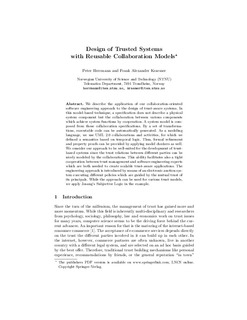Design of Trusted Systems with Reusable Collaboration Models
Journal article, Peer reviewed
Permanent lenke
http://hdl.handle.net/11250/261460Utgivelsesdato
2007Metadata
Vis full innførselSamlinger
Sammendrag
We describe the application of our collaboration-oriented software engineering approach to the design of trust-aware systems. In this model-based technique, a specification does not describe a physical system component but the collaboration between various components which achieve system functions by cooperation. A system model is composed from these collaboration specifications. By a set of transforma- tions, executable code can be automatically generated. As a modeling language, we use UML 2.0 collaborations and activities, for which we defined a semantics based on temporal logic. Thus, formal refinement and property proofs can be provided by applying model checkers as well. We consider our approach to be well-suited for the development of trust-based systems since the trust relations between different parties can be nicely modeled by the collaborations. This ability facilitates also a tight cooperation between trust management and software engineering experts which are both needed to create scalable trust-aware applications. The engineering approach is introduced by means of an electronic auction system executing different policies which are guided by the mutual trust of its principals. While the approach can be used for various trust models, we apply Jøsang's Subjective Logic in the example
